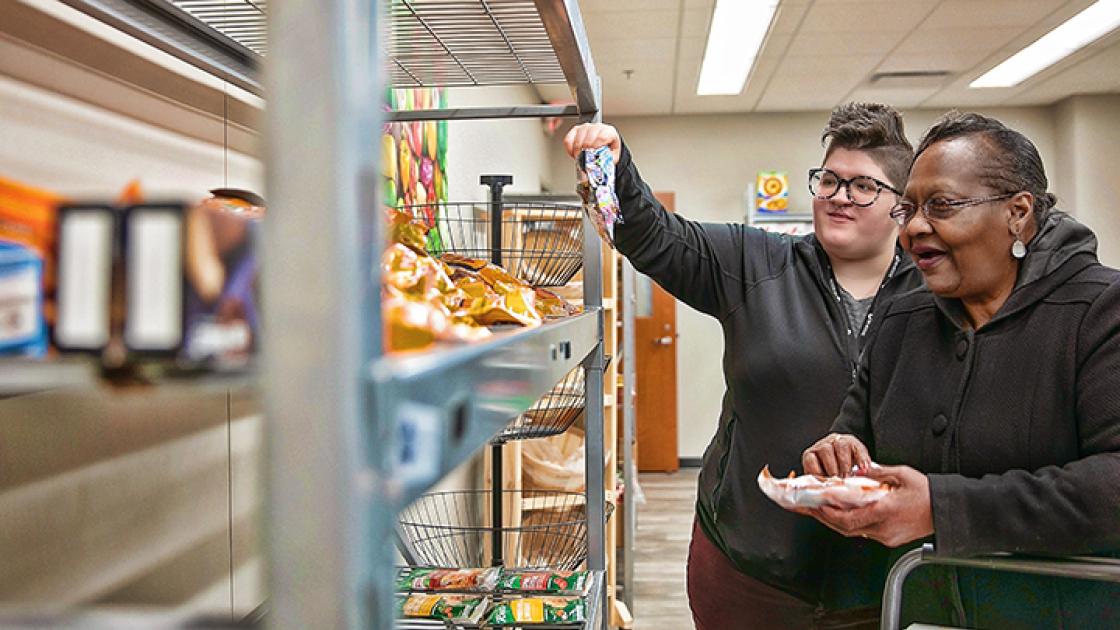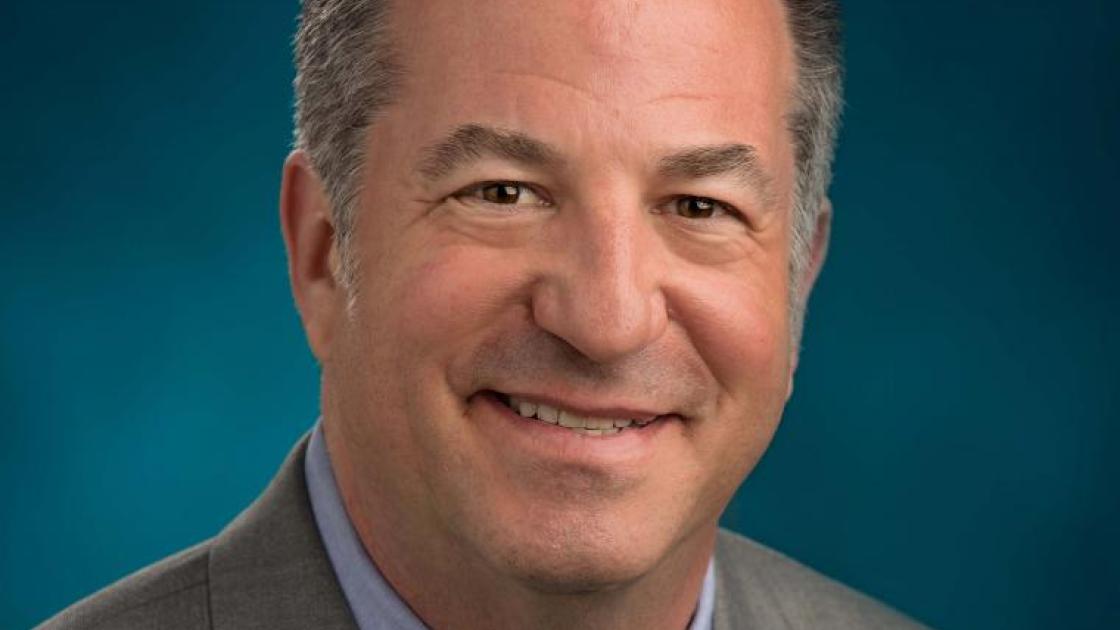
Better Days Ahead
Community health worker programs are improving lives in Illinois neighborhoods
On a gray February afternoon, Tami Langford is interviewing a new client in a busy office space at the Third Presbyterian Church in Springfield. Verlon Melton had been released from prison the previous spring and is now working in retail and raising his 3-year-old daughter as a single parent. He’d hoped to move into an apartment in the Enos Park neighborhood, where Langford serves as one of SIU Medicine’s community health workers. The man politely answers questions on a range of subjects. Eventually, Langford asks, “How’s your health?” Melton’s eyes drop. He mentions a nagging knee problem that sent him to the emergency department in December. The physician had prescribed a hinged knee brace, physical therapy and a pain reliever. Unfortunately, the low-dosage pain reliever proved ineffective and Melton was unclear on how to schedule time with a therapist. When the local medical supply shop offered a less supportive brace, he left disappointed. A former semi-pro athlete, Melton suspects he has knee dysplasia. For the past two months, he has been walking to and from work or calling Uber.
“We can help you,” Langford says. She picks up her phone and contacts the SIU Center for Family Medicine. Within minutes an appointment has been scheduled to establish care through a primary care physician. The center’s receptionist discusses insurance and Langford explains the Medicaid-funded transport system that Melton can use for his visit the following Tuesday. She offers to accompany Melton to this first clinic appointment to ensure things go smoothly and insists on doing the driving. Melton is grateful to have the new options. The promise of a health care worker at his side during the visit is a stress reliever. “Thank you, ma’am,” he says softly. Langford ends the call, makes a few notes and turns her focus again to Melton.
“So, besides the knee, how are you feeling?” she asks. Melton straightens up in his chair. “I’ll tell you, even though things are transitional right now, I’m happy,” he says. “To get up in the morning and see the smile on my daughter’s face, to just sit and have a cup of coffee across from her when she’s having her cereal. It’s the small things that make you appreciate life. I know if I keep pushing, there’s going to be better days.” Langford is now the one smiling. “Just to hear you say that inspires me,” she says. “Thank you for sharing that.”
Enos Park
The Enos Park Access to Care Collaborative was designed to spark these moments of inspiration and connection. Launched in October 2015, it targeted an underserved population who had difficulty navigating the complicated routes of the health care system. HSHS St. John’s Hospital and Memorial Medical Center agreed to fund the Enos Park neighborhood outreach program for three years, in collaboration with SIU’s Center for Family Medicine.
The program grew out of the Sangamon County Health Needs Assessment, in which area residents shared input at public forums and through online surveys to identify the region’s top health priorities. The two Springfield hospitals allocated $500,000 to support the project. Tracey Smith, DNP, director of population health integration and community health with SIU Center for Family Medicine, hired a pair of community health workers (CHWs), Shelly Weatherholt and Shirley Thompson, to focus on the most vulnerable members of the community. The goal was to improve conditions for those who were becoming marginalized within their own neighborhoods and offer a model for improving the health of impoverished communities.
SIU administrators measured more than 50 areas to gauge the program’s success. The key metrics included connection to primary care providers, enrollment in insurance programs, an ability to schedule and cancel one’s own appointments and achievement of basic needs (food, housing and income). The CHWs focused on the residents’ social determinants of health – the factors outside the doctor’s office that affect well-being – and tried to remove any barriers to accessing care.
In the initial interviews, residents are asked about the goals they’d like to achieve. These can include employment, housing, some connection to the community, improved care access, “really anything they feel they need,” Smith says. “It might be life or parenting skills. And since they set the criteria, it gives them ownership of the process.”
As it hit the 3-year mark, the program was exceeding expectations. Employment, health outcomes, safety measures and government relations were all improved. Visits to an emergency department had been reduced and replaced by regular appointments with a primary care provider. More than 520 of Enos Parks’ approximately 2,300 residents had been enrolled in the program. Of those, 372 attained their goals of self-sufficiency and “graduated” from the program.
Others noticed too. In July 2018, members of the Enos Park Collaborative were invited to San Diego to receive one of the American Hospital Association’s NOVA Awards, which recognized hospitals and health systems across the U.S. for their efforts toward improving community health.
The uniformly positive results and the strengthened social service networking within the Mid-Illinois (Springfield) Medical District inspired the hospital partners to renew the collaborative’s support for another three years. In addition, they encouraged SIU to expand the program in scope and range.
An adjacent neighborhood was already on their radar.
Pillsbury Mills
Its proximity to Enos Park, the Pillsbury Mills neighborhood in northern Springfield had a different demographic and a variety of challenges. Nearly 80 percent of its housing is rental properties, which makes for a more transient population. Railroad tracks and main streets used as commuting arteries crisscross the district. It is anchored by an 18-acre industrial site, a former Pillsbury processing facility that closed in 2001. Though surrounded by a fence, the property is a nagging safety concern. There was less neighborhood organization and limited connections with city and health officials.
In 2019 SIU Medicine created the Office of Community Initiatives and Complex Care (OCICC) to administer the work of the newly labeled Access to Health program that would include Pillsbury Mills. Bobby McKinney was hired as a CHW to build relationships within the neighborhood. Originally from Chicago, he had been a group facilitator and drug counselor at Helping Hands, and a former clergyman. McKinney began by walking around the region, introducing himself and literally reaching out, sharing business cards and offering a hand.
Initially, he was met with reticence and sometimes, resistance. “It was odd,” he says. “We knew residents had unmet needs and were interested in the community, but finding them wasn’t easy.”
Two months into the job, inspiration struck when a colleague suggested McKinney lower his expectations. “So I started parking my big Lincoln in different spots. I’d get out and just sit on the trunk. Folks would come by and make small talk, and I’d learn about them, asking about their families,” he says.
Now a fixed presence in the neighborhood, his phone soon rang with his first call. He went into action. Word of mouth spread, and McKinney’s days got much busier – and longer.
Now he considers it a compliment when clients call after hours and on the weekend, another sign of trust. “I tell people I don’t sleep, so they know they can call me if it’s an emergency.” And often it is. “There’s trauma, drug addiction, concern over their next meal and worry about the necessities.”
During ECHO training (Extension for Community Healthcare Outcomes; sidebar), McKinney tells new community health workers to expect these odd calls. “This is not structured. It’s their lives, and it’s especially unpredictable when someone’s health is going downhill.”
However, with the teams now engaged in the Access to Health model, an uphill trajectory is more common.
Case in point: Rosie Jackson. A senior Enos Park resident, Jackson suffered from knee, hip and back trouble that had her in “a lot of pain.” Following heart surgery in 2019, she met regularly with a primary care team at SIU Center for Family Medicine that included a dietitian and CHWs. McKinney started taking her to therapy appointments and to get groceries in her wheelchair. Over the course of several visits, he encouraged Jackson to forgo the wheelchair and begin using her walker. As her mobility increased, McKinney suggested she lose the walker and try getting around with a cane. Jackson’s pace eventually improved to the point where she lost 30 pounds. She credits McKinney and the family medicine team. “They keep me cheerful too,” she says.
Community Health Workers lead other programs in the Community Initiatives and Complex Care office, in addition to the Access to Health program. Three of the most active are the Nurse Family Partnership (which pairs a first-time, low-income expectant mother with a home-visiting nurse), ECHO training and the Community Mental Health Team. Abigail Ivancicts works in the latter. She completed an internship at SIU Center for Family Medicine and is now pursuing a master’s degree in social work at the University of Illinois-Springfield. Because 40 percent of her clients are homeless, she often collaborates with Chris Jones, the Springfield Police Department’s homeless outreach team officer and with the Memorial Behavioral Health staff and psychiatrists at Family Medicine to coordinate care. Therapists Meghan Golden and Kathy Martin are licensed clinical social workers on the OCICC staff available to counsel clients.
“It’s called ‘complex care’ for a reason,” Ivancicts says. “We work with the people who have struggled to succeed in other community health programs. But we’ve got great support. The SIU physicians understand what we do: They’ll make an appointment or a walk-through if someone just needs a prescription, get the patient signed up for whatever they need. There’s a lot of collaboration, and it makes our job easier.”
Education & expansion
The OCICC also focuses on educating the next generation of health care providers within the complex care model. “Very few U.S. medical schools allow students to learn about providing care for individuals struggling with complexity,” Smith says, “but SIU has a multitude of ways for students to get involved throughout their four years.” These include working in teams with a CHW or working with other students to organize care for a high-risk, high-need patient, also known as “hot-spotting.” In fact, the National Center for Complex Health and Social Needs chose SIU School of Medicine as one of its four national hub sites for student hot-spotting training, a 6-month curriculum program that students can take at any stage of their education.
Social workers and undergraduate students in business, engineering and nursing are also learning the intricacies of complex care in the OCICC. Residents may rotate in as well, to gain community-focused training outside the office.
As the group’s innovative work has caught on, many external and state organizations have contracted with SIU to expand their community health programming with CHWs. More than 20 new contracts and grants have been received during the past two years, prompting planning for a more cohesive structure. In July 2019, SIU School of Medicine established the OCICC within the Office of External Relations. In January 2020, its staff moved into a new building at 401 N. Walnut Street in Springfield and began renovations to accommodate new staff and workspace needs. In February the group received a $400,000 Illinois state grant to establish a trauma recovery center at the facility. It will be modeled on a system established in California to help address adverse childhood experiences.
What does the future hold? SIU has been working with state officials at IDPH, DHS and CMS to pursue a sustainable billing model for its services. The fiscal component is tied to personnel needs. “We want to continue to expand the number of community health workers in all of our service areas,” Smith says. “We currently have CHWs in our four residency training sites and want to work with our other service sites to assist the rollout of a CHW program. We’ve listened to our community and learned what services are needed.”
“Our motto is ‘listen, look and love.’ Then we’ll be able to identify individual and community needs and help make connections to services, whether it’s to the neighborhood police officer, to a health care provider, a social service agency, landlord, or whoever or whatever is identified. We believe that our mission is to take the ‘complex’ out of complex care and just care for people and communities.”
ECHO training extends outreach
ECHO training for community health workers (CHWs) is one of the most in-demand modules offered at SIU School of Medicine. Project ECHO® (Extension for Community Healthcare Outcomes) is a hub and spoke educational model that connects specialists in academic medical centers (“hubs”) to community health workers in rural and underserved communities (“spokes”) via workshops and videoconferencing. The ECHO sessions involve a case-based learning approach that contains 15-minute didactic lessons and patient case presentations by CHWs at participating spoke sites.
SIU School of Medicine and the Illinois Health and Hospital Association coordinate the three-day training workshops to transform the way rural, underserved communities learn and share knowledge. The CHW module includes sessions on diabetes, asthma, oral health and hypertension, as well as immersive, boots-on-the-ground trips into the neighborhoods. Experts can mentor and discuss their medical experiences with participants who acquire new skills and competencies to better manage patients with complex health conditions.
Since October 2019, 56 individuals have undergone the CHW training. At a February CHW workshop at SIU Medicine, Michelle Sanders, director of development and marketing at Heartland Health Service in Peoria, came with her patient navigator to listen and learn from the community health workers. With eight locations in Tazewell County, Heartland’s clients face common challenges: transportation, food insecurity, chronic disease management. Sanders sees the importance of taking a holistic, nuanced approach to improve self-sufficiency. “We’re trying to reduce the cost on the health care system and improve the quality of life for our patients at the same time.”
“ECHO is a cost-effective way to grow your program and get over some hurdles,” she says. “Listening to these other organizations is giving us great ideas.”
In addition to community health worker training, SIU offers single-day ECHO modules for
- Hypertension
- Opioids
- Memory and aging
Participants earn continuing medical education credits for each.



